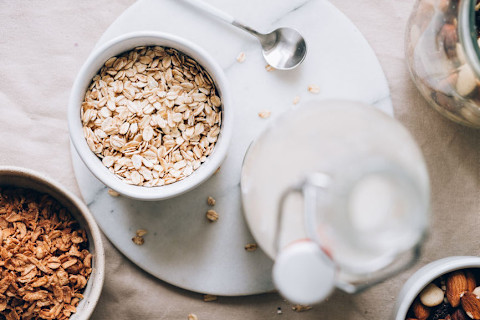
If you're like most people, you've probably never heard of something called beta-glucan. The basic gist? It's a soluble fiber found in oats, oat bran, and barley that may help support heart health by lowering the levels of total and LDL (bad) cholesterol in your blood, as part of a heart-healthy diet low in saturated fat.
How legit are the benefits?
Scientists have been studying beta-glucan extensively over the past 50 years. One benefit in particular stands out: There has been strong evidence for its link to lowering bad cholesterol levels1, so the FDA has allowed a label claim describing the relationship between heart health and oat fiber for food products that contain 0.75 grams per serving of beta-glucan. Three grams daily are needed to achieve the benefit. Similar claims are recognized by health agencies in Canada and Europe. That's a huge deal, considering that heart disease is the leading cause of death2 for both men and women in the U.S., according to the CDC, and the No. 1 cause of mortality globally3, according to the World Health Organization.
Where do you get it?
Beta-glucan is not an essential nutrient. It's a natural-fiber polysaccharide (a large molecule made up of multiple sugar molecules) that comes from oats, oat bran, barley, and wheat, as well as some types of fungi like baker's yeast and mushrooms maitake and reishi. And yep, it's available in supplement form, but the best and easiest way to get fiber is through your diet—more reason to up your grain intake if you haven't yet!

Still, beta-glucan shouldn't be considered a medicine of any kind for heart health, and it in no way gives you a free ride to a healthy heart. A meta-analysis of numerous studies over 13 years have found that 3 grams of beta-glucan from daily oat, oat bran, or barley consumption4 may help reduce the risk of disease as long as it's part of a regular diet that's low in fat and cholesterol.
Put it this way: An 8 oz. serving of Quaker's new Oat Beverage, which has the FDA "healthy heart" label we talked about, contains 0.75 grams of beta-glucan, one-quarter of the 3 grams needed daily to get its benefit (a serving of Quaker Oats provides about 2 grams). So on top of maintaining a healthful diet day to day, supplement a cup of creamy Oat Beverage with other sources of oat soluble fiber, and you're doing good things for your heart on the daily.
How does this all work, exactly?
Based on research, it's probable that there's more than one way that beta-glucan is thought to help lower cholesterol. One mechanism involves forming a thick gel in our intestines, binding to the cholesterol there, and thus preventing it from being reabsorbed5 into the bloodstream. (And since beta-glucan is partially indigestible, it takes some of the cholesterol out with it6 during your bathroom break.) Another mechanism involves triggering the liver to pull LDL cholesterol from the bloodstream in order to produce bile7 needed for digestion. It's a dirty job, and we can thank beta-glucan for it.
7 Sources
- https://www.ncbi.nlm.nih.gov/pubmed/21631511
- https://www.cdc.gov/dhdsp/data_statistics/fact_sheets/fs_heart_disease.htm
- https://www.who.int/news-room/fact-sheets/detail/the-top-10-causes-of-death
- https://www.sciencedirect.com/science/article/pii/S0899900710003941
- https://www.ncbi.nlm.nih.gov/pubmed/19571787
- https://www.ncbi.nlm.nih.gov/pmc/articles/PMC5810204/
- https://www.cambridge.org/core/journals/british-journal-of-nutrition/article/barley-glucan-reduces-blood-cholesterol-levels-via-interrupting-bile-acid-metabolism/F48053467893E28DF785656521C79D83
